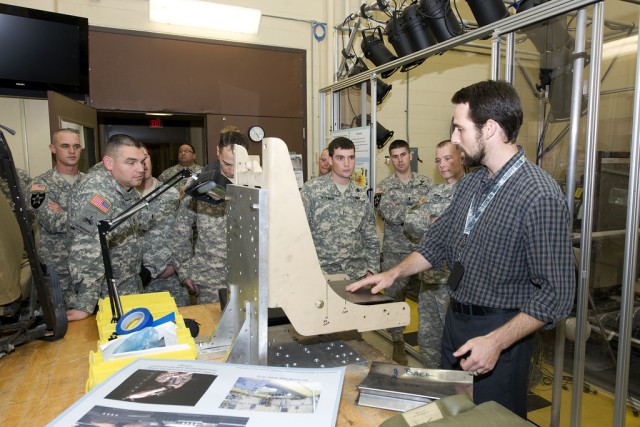
ADELPHI, Md. -- The scientists and engineers at the U.S. Army Research Laboratory are constantly developing technology solutions for Soldiers involved in today's and for tomorrow's conflicts, but the distance from the battlefield to the lab can be far.
Helping bridge the gap, more than a dozen recent Afghanistan combat veterans from the Army's I Corps, headquartered at Joint Base Lewis-McChord, Wa., visited ARL Nov. 10 as part of a two-week U.S. Army Research, Development and Engineering Command tour.
"You're the only reason we're here," said John Miller, ARL director, to the room filled with Soldiers. "We need to get your feedback and understand what works for you."
For ARL's language translation researchers, the visit was extremely helpful in getting first-hand information about how the warfighters deal with the communication barriers in the country. A small group of Soldiers were briefly told about where the testing and research is for the Army's written and spoken translation program. The scientists then eagerly listened to what the Soldiers thought about their efforts.
"If there's an instrument that could enable me in the absence of an interpreter, that would be an awesome tool," said Lt. Steven Beckman to the scientists. "It would allow me to delegate a lot more and get more done, especially the written (translation)."
The language translation tools are quickly becoming more advanced but are not able to replace a translator or interpreter, said Dr. Melissa Holland, chief of the Multilingual Computing Research Branch. But, the speech translators could ideally be used to know Soldiers can trust what a translator in the country is saying.
"We want to give them backup verification," she said.
This is a sentiment echoed by at least one Soldier who pointed out a handheld commercial translator he had problems using in Afghanistan.
"From him, we learned that some of the one-way speech translators that had good press coming out of the field don't always work as well as the press indicated," Holland said.
In just 30 minutes of interaction with the candid Soldiers, the translation scientists also heard accounts of how important having their documents translated is to the operational mission as well as some of the other Afghanistan-specific communication issues they deal with.
Regional variations dominate the language landscape in the mountainous country, making it very difficult to find interpreters who can communicate for the Soldiers. And compounding the dialect issues is the widespread illiteracy.
"The linguists that you do have, their language might not be the same," said Staff Sgt. Marcus Pullum, an intelligence specialist.
Holland's team is actively addressing the issue. They have to build more of the language database for Pashtu and Dari, the two mostly spoken in the country, since they're not nearly as well documented as more commonly spoken world languages such as French and Spanish. But add the dialects to the mix, and they have a big challenge, she said.
"We need to do a lot more work on collecting data on these dialects to produce speech," she said. "There aren't many tools available anywhere, and it's also a critical area."
She has two scientists in Afghanistan right now working on that as well as other aspects of the language research and testing and was very happy to get both the perspective of her researchers on the ground and the Soldiers visiting the lab.
"Even a little bit of time spent with a Soldier can yield a world of insight," Holland said.
Pullum said he appreciates what the language and other RDECOM scientists are doing to help him perform his job, and he hopes they "keep doing research because more research equals better products."
He did have some advice for the scientists though.
"Soldiers are simplistic. We don't thrive in Pythagorean theorems," Pullum said. "Keep it simple and more lethal, and it becomes more helpful."

Social Sharing